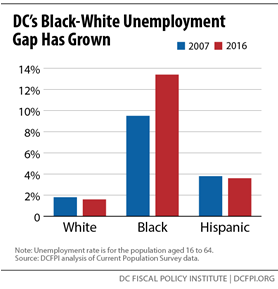Despite significant economic growth in the District since 2010, and an overall drop in unemployment, the recovery since the Great Recession has been very uneven, particularly across racial groups. Black DC residents continue to experience elevated rates of joblessness since the Great Recession of almost a decade ago—meaning they cannot find a job despite actively looking. As a result, the black-white unemployment gap in DC is widening even further.
Black DC residents are the only racial/ethnic group whose unemployment rate is actually worse than it was in 2007, prior to the Great Recession, according to a DCFPI analysis of data from the Current Population Survey. While unemployment among black working-age DC residents has fallen in recent years, 13.4 percent still were unemployed in 2016, compared with 9.5 percent in 2007. Meanwhile, just 1.6 percent of white residents and 3.6 percent of Hispanic adults were unemployed in 2016.
 The slow decline in unemployment among black residents affects the entire District. DC’s overall unemployment rate in 2016—6.4 percent—was still higher than the 5.6 percent rate in 2007. If black unemployment had fallen at the same rate as for other groups, the city’s unemployment rate today would be lower than in 2007.
The slow decline in unemployment among black residents affects the entire District. DC’s overall unemployment rate in 2016—6.4 percent—was still higher than the 5.6 percent rate in 2007. If black unemployment had fallen at the same rate as for other groups, the city’s unemployment rate today would be lower than in 2007.
Because unemployment for black DC adults has not fallen substantially in the economic recovery, unlike white and Hispanic workers, DC’s unemployment gap across race is growing.
- Black unemployment in DC is far higher than white or Hispanic unemployment
- Black residents are four times as likely as Hispanic residents to be unemployed, and eight times as likely as white residents
- The black-white unemployment gap is far higher now than in 2007, when black residents were five times more likely to be unemployed than white workers
This racial unemployment gap even affects residents with an advanced education. Black college graduates have a higher likelihood of being unemployed than other residents who also have a Bachelor’s degree or higher. Furthermore, unemployment has not fully recovered from the recession for black college graduates, while it has for other college graduates.
- The unemployment rate among black college graduates was 5.7 percent in 2016. Although this is substantially lower than the overall unemployment rate for black workers, it is three times higher than the 1.9 percent rate for non-black college graduates.
- While non-black college graduates now have a slightly lower unemployment rate in 2016 as before the recession, black college graduates are still more likely to be unemployed today than before the recession, when their unemployment rate was 4.2 percent.
Although the black-white unemployment gap is often attributed primarily to disparities in education, this indicates that other factors, such as systemic racism and employment discrimination also contribute to high unemployment among black residents.
Read the full report here.
